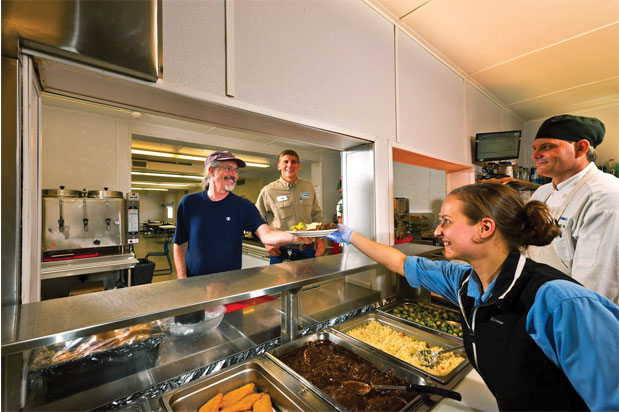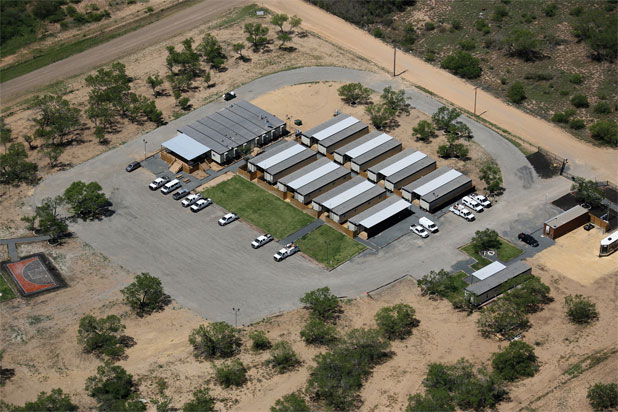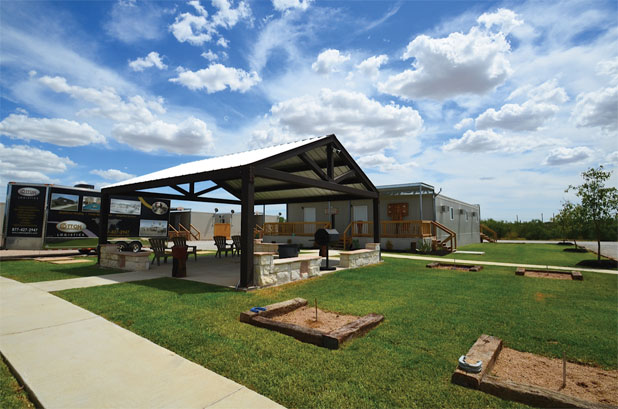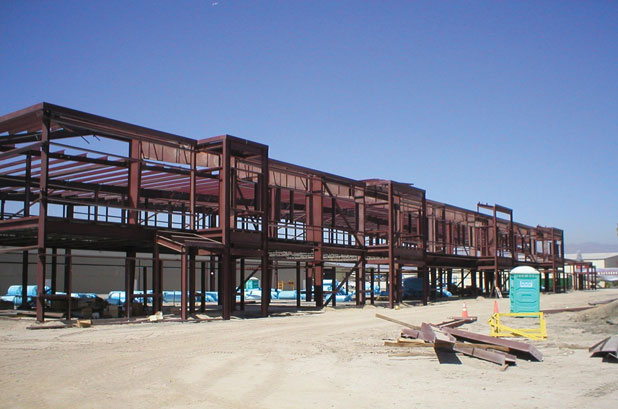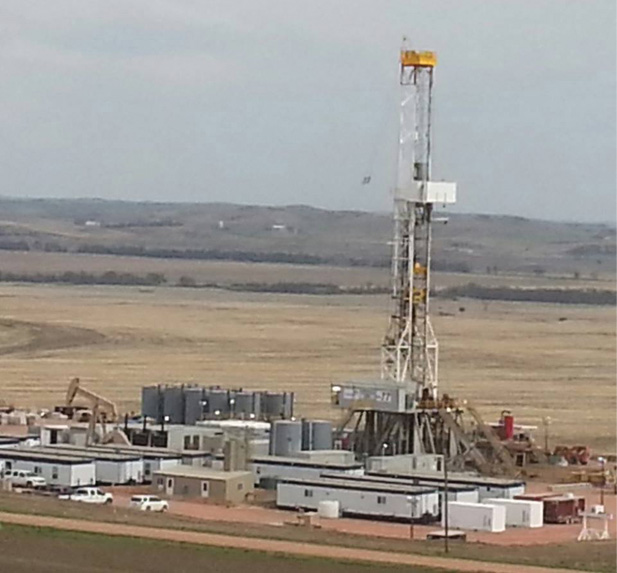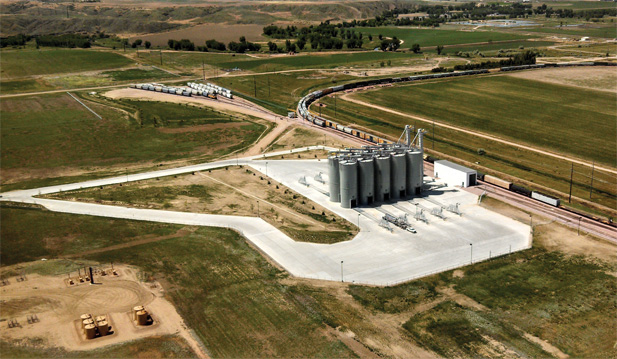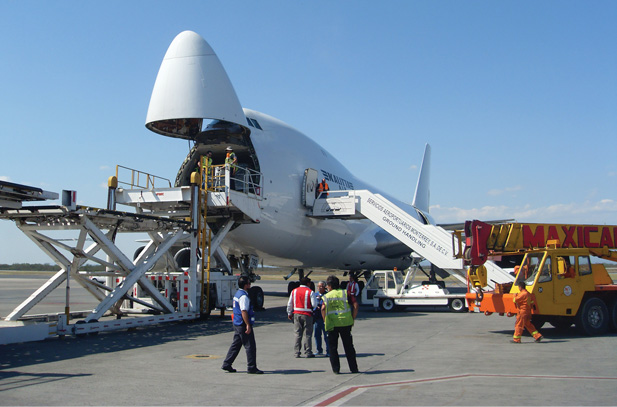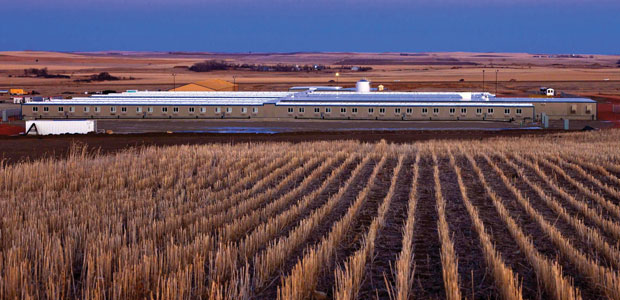
From Equipment To Personnel, Logistics Vital To Oil Field
By Al Pickett, Special Correspondent
Moving equipment and personnel in a timely manner is every bit as complicated in today’s oil and gas industry as in a military operation. The term, “logistics,” in the oil and gas industry includes everything from moving drilling rigs and other equipment to moving workers and providing temporary housing for them.
Today’s logistical challenges are even greater because of the increased drilling generated by the booming oil and gas resource plays dotting North America. Three of the most prolific oil-producing regions alone–the Bakken, Eagle Ford and Permian Basin–are all in remote, sparsely populated areas, thus making the need to construct temporary housing as important as getting the right equipment and human resources to remote well sites.
Companies answering the call point to one crucial objective: off-setting long hours and rigorous workloads with housing creature comforts second to none.
Logistical Solutions
Target Logistics coined the phrase, “The Economics of Comfort®” to describe the superior nutrition, home-style comfort, and array of entertainment and fitness amenities its facilities offer, including sitewide Wi-Fi Internet connectivity.
Housing the large number of personnel needed to develop shale plays is an important part of the production equation. According to Brian Lash, “Remote housing is a key ingredient to any oil boom.
“We are as necessary as good roads and sewage treatment; we are part of the fabric of success,” continues the founder and chief executive officer of Target Logistics, which Lash says is the largest turnkey workforce housing provider in the United States.
After its merger with Algeco Scotsman earlier this year, the company became the second largest provider of workforce housing in the world, operating 14,000 beds in 38 counties for the mining and oil and gas industries, Lash adds.
He says Target Logistics operates 16 properties in North America with more than 5,000 beds. Nearly 4,000 of those beds are in North Dakota. Target also has a facility in Arizona, one in South Texas, one in the Permian Basin and one in Veracruz, Mexico, and Lash says the company is looking to expand.
With administrative headquarters in Boston; operational headquarters in The Woodlands, Tx.; and offices in Williston, N.D.; Denver; Edmonton, Alberta; and Sydney, Australia, Lash says Target Logistics provides cost-effective and customized site design, construction, catering, security, housekeeping, transportation, operations and maintenance services for temporary workforce lodging, mobile crew camps, and extended-stay hotels.
“Labor shortages abound in these locations,” Lash notes. “Further complicating this, companies that are successful in finding labor soon find that a lack of housing is an issue. We provide a well-organized, comfortable solution. Whichever term you use–workforce housing, temporary housing, crew camp, modular housing, emergency housing, or extended-stay hotel–having the right accommodations takes more than just four walls.”
Emphasis On Comfort
Target Logistics’ chefs are trained at culinary schools and each man camp employs a nutritionist. Meals include hand-cut French fries, real mashed potatoes, and smoked brisket and ribs on “Smokin Saturdays.”
Tom Schneider is chief marketing officer for Target Logistics. He says the company has coined the phrase, “The Economics of Comfort®” to describe the superior nutrition, home-style comfort, and array of entertainment and fitness amenities it offers at its facilities.
Lash claims man camps have come full circle, offering so much more than just a place to sleep. “We serve the best food in the industry, the freshest produce, fish and beef,” he proclaims. “We even have hand-cut French fries every day. Our mashed potatoes are made from real potatoes. Our chefs have been trained at culinary schools, and we have a nutritionist. We are always spicing up the menu. For example, we often have ‘Smokin Saturdays’ with smoked brisket and ribs.”
Some Target Logistics facilities also include swimming pools, and basketball and volleyball courts, and all have saunas and state-of-the-art gymnasiums. Lash says his company’s facilities provide pillow-top mattresses and overstuffed pillows, flat-screen televisions with satellite or cable access and DVD players, microwaves and refrigerators, desks and wardrobes, individual climate control, housekeeping services, 24-hour dining areas serving three hot meals a day, a convenience store, Internet café and sitewide Wi-Fi Internet connectivity, and free self-service laundry.
“It decreases boredom and gets men ready for the workday,” Lash says. “We offer great food and great housing.”
Target Logistics has zero tolerance for alcohol, drugs, firearms and other weapons, harassment and cohabitation in its properties, Lash continues. Violating those restrictions will result in eviction, and often loss of a job from the company leasing the facility, he says. Security is a key element of Target Logistics’ facilities as well. Lash says workers can go to sleep at night, knowing they are safe in their facilities.
Filling A Niche
When Target Logistics came into North Dakota as the Bakken play was taking off, Lash says the local communities didn’t know what to expect.
“A lot of people, including the mayor of Williston, wanted to focus on building private residences,” he recalls. “The Bakken actually started to get overbuilt. Hotels went from 100 percent occupancy to 70 or 80 percent, and apartment rentals declined.
“Now, politicians recognize that we are a necessary function, and we will be here for a long time,” he says. “Every man can’t possibly move here. His mortgage may be upside down and he can’t buy a house in Williston, or his kids are involved in school in Birmingham, Al., and he is not going to move his family. So he flies in and out. He needs to place to live when he is working.”
Each Target Logistics location is different, according to Lash. He says the largest is Tioga Lodge, which has 1,038 beds with 100 RV spots in North Dakota. Target owns the Tioga Lodge and operates it with the Hess Corporation.
“We always strive to find land that has water, sewer and power,” Lash points out. “If not, we build it. The Tioga Lodge cost $40 million, and $10 million of it was spent underground. The folks in the small town of Tioga, N.D., said, ‘We need you guys, but our system can’t handle the extra waste treatment.’”
So, Target Logistics built a sewage treatment facility, which not only treats its own water, but waste from its neighbors as well. “It is the first and only facility that can turn black water into water that can be used for fracturing, or can be sprayed onto farms for irrigation,” Lash states.
Until recently, Lash says Target Logistics allowed only workers from a company it had contracted with to stay in its facilities. “But now we are starting to accept individuals for one night or as long as they want to stay with a credit card,” Lash reveals. “We are moving to a true open-camp format. We may show 100 percent occupancy, but not all the rooms may be filled on a particular night, so we have permission to resell those rooms and give (the company that has leased the entire facility) its money back. It is a win-win situation.”
Start In Disaster Recovery
Cotton Logistics went from providing emergency housing for disaster recovery operations to providing turnkey housing and services to the oil and gas industry. The company operates four lodges in Texas, including this facility in Cotulla.
Logistics are meant to avoid emergency situations, but it was a disaster emergency that launched Cotton Logistics into the business of providing remote turnkey housing and services.
Ron Brittain, Cotton Logistics’ vice president of business development in Katy, Tx., says its parent company is one of the largest commercial property firms in the world.
“Natural disasters present the same problems as oil field operations,” he compares. “For example, we respond to an area that has been affected by a hurricane, and the infrastructure typically is damaged and uninhabitable. To be able to start recovery efforts, we have to be able to provide safe and comfortable housing to our labor force, which is where the roots to Cotton Logistics began.”
When the Macondo blowout and oil spill occurred in the deepwater Gulf of Mexico in 2010, Brittain says British Petroleum contracted with Cotton to provide temporary facilities to house 3,000 people in addition to catering up and down the Gulf Coast.
Cotton Logistics’ Chief Executive Officer Pete Bell comments, “A service that we provided internally for more than 15 years to our parent company, Cotton Global Disaster Solutions, was perfected with years of on the job trial and error while responding to the world’s largest disasters.”
Brittain adds, “Cotton Logistics has been able to apply those experiences to the housing shortage in the oil and gas plays. We now have four lodges in Texas: one in Midland in the Permian Basin, and three in the Eagle Ford in Karnes City, Carrizo Springs and Cotulla, with additional projects in the works.”
Cotton Logistics attempts to dispel the negative connotations and stereotypes associated with oil field man camps by providing safe, comfortable and enjoyable housing that has not always been standard in the industry, says Vice President of Business Development Ron Brittain.
He notes that three of Cotton’s four lodges are operated privately for the world’s largest oil field service provider, while the company also has a part of the Carrizo Springs facility. “Our niche is designing/building and providing services specific to meet our customer’s needs,” Brittain continues. “There always have been man camps in the oil and gas industry, but they had a negative connotation. Our goal is to dispel the stereotypes that had become the norm in oil field housing, and provide a customer experience that is safe, comfortable and enjoyable. We offer amenities and services that have not always been standard in workforce housing. We have ‘set the bar’ for man camps going forward.”
Offers Bell, “We have been very excited about our market success and satisfaction over the past two years. We look forward to introducing the trademarked ONE LODGE brand in the coming months, which will be our customizable community for clients.”
Real Estate Development
Western LLC is a specialized real estate developer that provides oil field clients with site facilities ranging from lay-down yards and tank batteries to corporate and field offices, such as this two-story complex under construction in Chino, Ca.
Western LLC is a specialized real estate development and design/build firm with offices in Midland, San Angelo, and Corpus Christi, Tx., Denver, and Artesia, N.M. It provides a simple, cost-effective “one-stop shop” for all design, permitting and construction of oil field facilities, including corporate and field offices, maintenance and storage buildings, saltwater disposal facilities, tank batteries, truck wash facilities, lay-down yards, and all associated site development, according to President Brad Henderson.
“We work to understand our client’s needs, what they are trying to do, how many people will occupy the facility, future expansion plans, target budget, and completion schedule,” he outlines. “We try to accommodate economic expansion capability in the original facility. We will work through the economics and even offer a facility lease back, so clients can continue putting resources into their drilling program. We are true turnkey developers, so much more than just general contractors.”
Henderson laughs when he remarks that everything in the oil and gas industry is an emergency. “When the boom picked up,” he says, “people would tell us they should have made this decision six months ago. They envisioned a building for 35 people, but by the time it was completed, it was filled with 70 people. It is mind-blowing, how fast things are moving in the Permian Basin, the Cline Shale and the Eagle Ford.”
In many cases, clients think of Western as their own “in-house” real estate department, Henderson insists. The company handles everything from property acquisition, entitlements and mitigation, to full design and engineering, permits, and complete construction. “We do it all,” he states. “Western supports an oil and gas company’s every need, from setting up a new remote location for its staff to providing corporate hangars and terminals for its flight department, such as the new hangars we are developing at Midland International Airport.”
Henderson also points to Western’s Executive Residences at Permian Point in Midland. “To meet the needs of highly mobile executives, we are providing these condominium style residences in key locations to make executives more efficient in the face of costly hotel rooms, limited availability, and poor quality,” he describes. “To further expedite expansion, Western is developing industrial parks so clients can quickly acquire ground and complete facilities in key oil and gas markets, similar to Western’s industrial park at Permian Point, which is located across from the Midland International Airport and creates an easily accessible location for facilities with a mix of lots from three to 50 acres.”
Henderson says Western came up with the idea of executive residences when a client described its problem housing executives, clients, VIPs, and flight crews in high-housing-demand areas. “It’s like winning the lottery, if you can get a bare-bones hotel room in Midland or Odessa,” he quips.
The Executive Residences at Permian Point are condominiums, which companies will own or lease, including executive-style office space. Henderson says they are designed for the executive or company that wants a place for VIPs or other executives that is always available, without having to search for a hotel room when they come to the Permian Basin.
“We offer full amenities, just like a luxury hotel, so they have the best of both worlds,” he emphasizes. “We now are in the presale and entitlement phase of this development.”
Henderson comments that explosive growth in the Permian Basin, Eagle Ford and Cline Shale has created a situation that puts local communities “behind the eight ball” in terms of accommodating the influx of people, and associated oil and gas operations. He praises the Cline Shale Alliance, a consortium of city leaders in the emerging Cline Shale play on the Permian Basin’s Eastern Shelf that has been planning for growth in anticipation of Cline Shale development.
“These city leaders are to be patted on the back for being proactive,” he says.
Modular Buildings
ATCO Structures and Logistics manufactures modular buildings frequently found at well sites. It provides facilities ranging from skid-mounted housing for rig hands to a building to house the tool pusher.
The key line of business for ATCO Structures & Logistics is manufacturing modular buildings that have a variety of uses. Chief Operating Officer George Lidgett says many buildings manufactured in the Unites States are destined for the well site, ranging from skid-mounted housing for rig hands to a building to house the tool pusher. The company also builds workforce housing camps.
Originally named Alberta Trailer Hire, ATCO was established in 1947 in Alberta, Canada, by father S.D. and son R.D. Southern. According to Lidgett, the company provided housing accommodations to remotely based workers during Canada’s first oil boom. The parent company of today, ATCO Group, has evolved into a $14 billion, multinational player in various industries, including utilities and construction, he adds.
Lidgett says ATCO Structures & Logistics has manufacturing facilities in the United States, Canada, South America and Australia, with operations on six continents. It specializes in providing bundled services, which mean not only constructing and installing a modular housing complex, but all the associated camp services such as in-house catering, and janitorial as well as site maintenance, he explains.
ATCO has three U.S. manufacturing facilities, located in Diboll and Wichita Falls, Tx., and in Pocatello, Id., with sales offices in Houston and Denver.
“We have been particularly successful with our ‘build, own, operate’ model for workforce housing. Our lodge in Williston, is such an example,” says Lidgett. “We try to create a ‘home away from home’ environment that will enhance productivity while respecting budgetary requirements for oil field accommodations.”
With continued strong demand for well site units, Lidgett says ATCO makes single, stand-alone units designed to withstand the climate and wind loads of any region in the lower-48. He says a standard unit provides comfortable accommodations, energy-efficient windows, inter-room sound transmission control, full-size beds, and private washrooms. Each room is furnished with its own PTAC (packaged terminal air conditioner) unit, to provide occupants with individual climate control, refrigerators, and microwaves.
“With oil and gas activity picking up in many parts of the United States, we are preparing for growth,” adds Lidgett. “Having had considerable success around the globe, we are looking to bring our bundled solutions to areas of the United States that are desperately in need of safe and comfortable workforce accommodations.”
Hauling And Installing
After the modular buildings are manufactured by ATCO, someone has to haul them to the work site and install them. That is where companies such as Cowboy’s Services in Baytown, Tx., come in.
“We do everything from moving housing to rig components,” says Cowboy’s Services owner Keith “Bubba” Jannise, whose father started the company 42 years ago. “If we don’t haul it, we don’t install it.”
Jannise says his company owns a fleet of 14 trucks, hauling mostly direct for manufacturing facilities such as ATCO. He says his business hasn’t changed that much over the years. “We always have been hauling housing and equipment,” he comments. “But the pieces have gotten bigger and different.”
The first thing Cowboy’s Services does when it hauls buildings to a site is to take housing for its own crews, according to Jannise, because it may take weeks or months to install the new buildings. The company even brings its own portable generator until the power company can get electricity to the site. He says his company works in all conditions, although most of its work is in the desert in South and West Texas.
Jannise notes that Cowboy’s Services’ last project was a 150-building camp in the Permian Basin that included 700-800 modular units. It was a two-story complex, so a crane was needed to put the complex together. He says it took nearly two months to install the entire camp.
The shale oil boom has been wonderful for Cowboy’s Services’ business, Jannise acknowledges. “It has been wonderful for everyone,” he expands. “If they stop drilling, everything stops. When people have more money, they spend it.”
Logistics also are key element of Cowboy’s Services’ work, Jannise continues. “We have a start date and a finish date,” he points out. “We have never missed our deadline.”
Moving Sand
Halliburton delivers 350,000 trucks and 18,000 rail cars of sand each year from facilities such as this sand plant in Windsor, Co., which includes storage for 40 million pounds of sand and has the capability to unload 13 rail cars an hour and load 50 trucks an hour.
Oil patch logistics are about moving “stuff” as well as “things.”
“What wakes me up at night is how to make sure we are bringing the right sand into each play at the right location, and keeping it flowing,” says John Vogt of the sand required for hydraulic fracturing.
“We deliver 350,000 trucks and 18,000 rail cars of sand each year in the United States,” explains the vice president of logistics for Halliburton. “My job is to make sure we have on-time delivery, repeatability, reliability, and no lost revenue to make our customers successful.”
Vogt says Halliburton has put a lot of money into providing an “interface between rail and road in the right location.” He says Halliburton tries to offer storage locations for its sand that are a short distance from the wellhead. For example, he says Halliburton has two storage facilities (where sand is received and stored temporarily before being loaded onto trucks) and six “transload” facilities (where sand can be off loaded directly from rail cars to trucks) in the Bakken play alone.
“It is important to have a proper understanding of total logistic costs–rail, storage or transload facility, and road–to minimize costs,” he remarks.
To help its efficiency, Vogt says Halliburton has developed an automated reconciliation and payment system, which he calls a “very slick, integrated planning” system. Every truck that arrives at a well site has a bar code that is scanned, which confirms the right grade of sand arrived at the right location and records the amount of sand taken off the truck.
“It is as close to real time as you can get,” Vogt lauds.
He says Halliburton has spent a substantial amount of money in managing its rail transport system as well. That can be complicated, Vogt states, since in most cases, the sand is being delivered a considerable distance to the Permian Basin in West Texas or the Eagle Ford in South Texas.
Vogt praises the nation’s two major railroad companies–Union Pacific and BNSF (Burlington Northern Santa Fe)–for their cooperation in making sure the flow of sand needed for fracturing is operating without delay. He says Halliburton purchased a limited number of rail cars a couple years ago when there was a shortage of cars to transport sand, giving his company a competitive advantage at the time.
“It is more stable now,” he surmises. “We know the customer is the most important thing, and that is something we have built into the network. It is our job to move the sand cost effectively and swiftly, with reliability and agility for our customers. We have the ability to be agile, focused and flexible.”
Aviation Services
CSI Aviation provides airplanes ranging in size from a single-engine Cessna to a Boeing 747 to move people, equipment and supplies when and where they are needed, anywhere in the world.
Among the more unique logistical firms is CSI Aviation in Albuquerque, N.M. It is unique in that it doesn’t own any aircraft. “We are strictly a logistics firm,” explains Marc Ramthun, manager of sales and business development. “We find out what their needs are, and then we coordinate everything. It is a niche market.”
Ramthun says CSI Aviation started in 1979, doing charters for college athletic teams. It still does that, but the company has expanded to include providing air service for government agencies, corporate clients and emergency response. “We put the pieces together,” he remarks.
While much of its work for the oil and gas industry may be simply providing air service for company executives that need to be in four places in the same day–including setting up ground transportation and meals for them, which commercial airlines can’t accommodate–Ramthun says CSI Aviation has been involved in a number of more unusual logistical operations.
Perhaps the most unusual, he offers, occurred when a 50,000-pound piece of machinery broke at a production facility in Manitoba, Canada. The only place to get it fixed was in Naples, Italy. He says CSI Aviation found a Boeing 747 to haul the equipment from Winnipeg to Milan, Italy. The company coordinated trucking to the airport in Winnipeg and from Milan to Naples. It even worked with engineers to build a special case around the equipment to balance its weight and protect it on the 12-hour flight, Ramthun details.
CSI Aviation had to coordinate the cranes necessary to move the equipment at all locations and work with both Canadian and Italian customs. “It took three days to get the equipment to Naples, but we got the repaired part back a week ahead of schedule,” Ramthun relates. “It cost the company $1 million every day that equipment wasn’t operational. We saved it $7 million through our efficient efforts.”
Another unusual logistical situation for CSI Aviation involved some kidnapped oil workers.
“One of our customers had oil interests in the Nigerian delta,” Ramthun recalls. “Three Americans and an Italian worker were kidnapped. The company was negotiating their release, and it wanted to get them medical attention as soon as possible. So we flew into a neighboring country to wait. When the men were released, we flew in, picked them up and took care of their immediate medical needs. We flew to Rome, and then flew the three Americans on to a hospital in Germany.”
Ramthun says CSI Aviation has a network of companies to draw on, and can provide airplanes ranging in size from the 747 it needed to haul the equipment from Canada to Italy, to a single-engine Cessna that a fertilizer company in Alabama wanted for aerial surveying.
“Every day is different,” reflects Ramthun. “We could be flying oil company executives or moving a high school marching band.”
Such is the challenge of logistics, he says: planning for the unexpected and eliminating problems that come with “procuring, distributing, maintaining and replacing material and personnel,” often in remote locations. And it is a critical element in the oil and gas industry today.
For other great articles about exploration, drilling, completions and production, subscribe to The American Oil & Gas Reporter and bookmark www.aogr.com.















